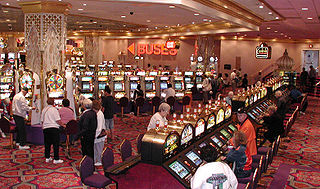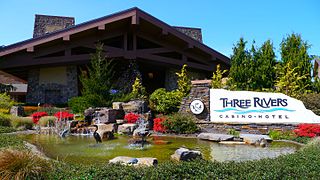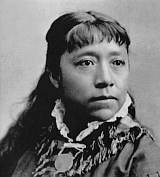
The Old Camp Casino was a tribal casino near Burns, Oregon, United States, owned and operated by the Burns Paiute Tribe.
Contents
The "Old Camp" name refers to a tribal settlement that was located on the site in the early 20th century. [1]

The Old Camp Casino was a tribal casino near Burns, Oregon, United States, owned and operated by the Burns Paiute Tribe.
The "Old Camp" name refers to a tribal settlement that was located on the site in the early 20th century. [1]
The tribe had difficulty financing development of a casino due to the reservation's remote location, with only 7,000 people living within a 100-mile radius. [2] [3] Out of four companies that responded to the tribe's 1997 request for proposals, the tribe selected Colorado-based Wolf Gaming to finance and manage the casino. [4] Later that year, however, Wolf Gaming went out of business. [5]
The tribe eventually secured a $930,000 loan from South Dakota-based Indian Gaming of America. [2] The tribe purchased the building itself for $180,000 from the Lummi Tribe, and moved it from northwest Washington to the Burns Paiute reservation. [6]
The casino opened in September 1998 with 15,000 square feet (1,400 m2) of space containing 75 slot machines, two poker tables, and a deli. [3] At opening, there were 53 employees. [3]
Another 100 slot machines were later added, while table games, proving unprofitable, were removed. [7]
The tribe closed the casino on November 26, 2012, due to safety concerns stemming from structural problems with the building. [8] The tribe said it would demolish the building and construct a new one, to be opened in spring 2013, [8] but as of October 2014, it had not opened. [9]

Native American gaming comprises casinos, bingo halls, slots halls and other gambling operations on Indian reservations or other tribal lands in the United States. Because these areas have tribal sovereignty, states have limited ability to forbid gambling there, as codified by the Indian Gaming Regulatory Act of 1988. As of 2011, there were 460 gambling operations run by 240 tribes, with a total annual revenue of $27 billion.

Harney County is one of the 36 counties in the U.S. state of Oregon. As of the 2020 census, the population was 7,495, making it the sixth-least populous county in Oregon. The county seat is Burns. Established in 1889, the county is named in honor of William S. Harney, a military officer of the period, who was involved in the Pig War and popular in the Pacific Northwest.

The Warm Springs Indian Reservation consists of 1,019 square miles (2,640 km2) in north-central Oregon, in the United States, and is governed by the Confederated Tribes of Warm Springs.

The Indian Gaming Regulatory Act is a 1988 United States federal law that establishes the jurisdictional framework that governs Indian gaming. There was no federal gaming structure before this act. The stated purposes of the act include providing a legislative basis for the operation/regulation of Indian gaming, protecting gaming as a means of generating revenue for the tribes, encouraging economic development of these tribes, and protecting the enterprises from negative influences. The law established the National Indian Gaming Commission and gave it a regulatory mandate. The law also delegated new authority to the U.S. Department of the Interior and created new federal offenses, giving the U.S. Department of Justice authority to prosecute them.

In the United States, gambling is subject to a variety of legal restrictions. In 2008, gambling activities generated gross revenues of $92.27 billion in the United States.

The Confederated Tribes of Warm Springs is a recognized Native American tribe made of three tribes who put together a confederation. They live on and govern the Warm Springs Indian Reservation in the U.S. state of Oregon.

Wildhorse Resort & Casino is a casino owned and operated since 1994 by the Confederated Tribes of the Umatilla Indian Reservation in the U.S. state of Oregon. It is located 5 mi (8 km) east of Pendleton, on the Umatilla Indian Reservation, near Interstate 84.
In the first decade of the 2000s, the Confederated Tribes of Warm Springs sought to build a casino in the Columbia River Gorge. They ended their pursuit of the project in 2013. They considered various sites, as early as 1999; the most extensive plan called for a 60-acre (24 ha) facility with 250 hotel rooms in Cascade Locks, Oregon. The proposed site is within the Columbia River Gorge National Scenic Area, and adjacent to a federally designated wilderness area, but within the city limits of Cascade Locks..
California v. Cabazon Band of Mission Indians, 480 U.S. 202 (1987), was a United States Supreme Court case involving the development of Native American gaming. The Supreme Court's decision effectively overturned the existing laws restricting gaming/gambling on U.S. Indian reservations.

Gambling in Oregon relates to the laws, regulations, and authorized forms of gambling.

The Burns Paiute Tribe of the Burns Paiute Indian Colony of Oregon is a federally recognized tribe of Northern Paiute Native Americans in Harney County, Oregon, United States.

The Summit Lake Paiute Tribe of Nevada is a federally recognized tribe of Northern Paiute Indians in northwest Nevada. Their autonym in their language is Agai Panina Ticutta, meaning "Fish Lake Eaters." They are traditionally known as the "Fish Eaters."

Paradise Casino is a small tribal casino located just outside of Yuma, Arizona on the Fort Yuma Indian Reservation. The property straddles the Arizona–California state line, but the casino building lies in Arizona. It is owned and operated by the Quechan Tribe of the Fort Yuma Indian Reservation.

The Mohegan Tribe is a federally recognized tribe and sovereign tribal nation of the Mohegan people. Their reservation is the Mohegan Indian Reservation, located on the Thames River in Uncasville, Connecticut.
Legal forms of gambling in the U.S. state of Texas include the Texas Lottery; parimutuel wagering on horse and greyhound racing; limited charitable bingo, limited charitable raffles, and three Native American casinos. Other forms of gambling are illegal in Texas.

The Fort McDermitt Paiute and Shoshone Tribe is a federally recognized tribe of Northern Paiute and Western Shoshone peoples, whose reservation Fort McDermitt Paiute and Shoshone Tribes of the Fort McDermitt Indian Reservation spans the Nevada and Oregon border next to Idaho. The reservation has 16,354 acres (6,618 ha) in Nevada and 19,000 acres (7,700 ha) in Oregon.

Dotty's is a chain of slot machine parlors with about 175 locations in Nevada, Oregon and Montana and another 150 locations planned in Illinois. The business model is controversial, with sites "offering minimal food and beverage choices with a heavy focus on gambling." The chain has a clean, well-lit atmosphere meant to invoke "your grandmother's kitchen" and is demographically targeted towards women aged 35 and older.

The ilani Casino Resort is a casino operated by the Cowlitz Indian Tribe and located near La Center, Washington. The casino opened on April 24, 2017, after a lengthy legal battle over the tribe's right to establish a reservation on which to build the casino.
Legal forms of gambling in the U.S. state of Connecticut include two Indian casinos, parimutuel wagering, charitable gaming, the Connecticut Lottery, and sports betting.

Angel of the Winds Casino Resort is a casino and hotel operated by the Stillaguamish Tribe of Indians near Arlington, Washington, United States. The casino opened in 2004 east of Interstate 5 and was initially in a modular building until an expansion in 2008. A 125-room hotel opened at the site in 2015 alongside additional gaming space.